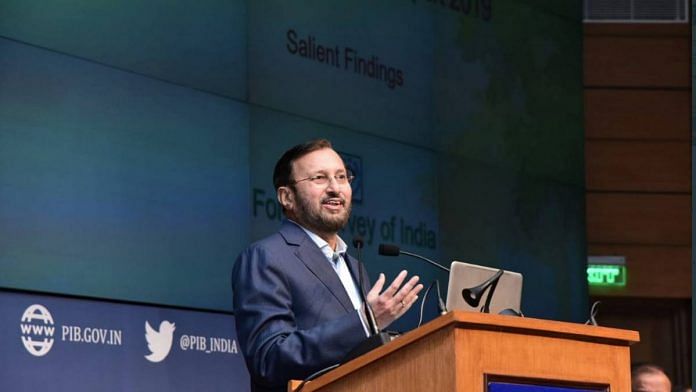New Delhi: The Narendra Modi government has received over 17 lakh emails and letters in response to its draft Environment Impact Assessment (EIA) 2020 notification, ThePrint has learnt.
The draft EIA was published published by the Ministry of Environment, Forest and Climate Change in March and people’s feedback was sought. Once approved, it will replace the existing EIA Notification 2006.
Sources in the ministry told ThePrint that it has received over 17 lakh responses to the draft EIA. Some responses were, however, similar to each other, they said.
The ministry has now asked the CSIR’s National Environmental Engineering Research Institute to compile and vet these responses to prepare the final draft, added a source.
The government updated the EIA norms to make the process of environmental impact assessment “more transparent and expedient”, stated the draft.
Environment Minister Prakash Javadekar had said in June the draft EIA was aimed to enhance the ease of doing business by reducing delays in approving project applications and licenses.
An EIA is intended to estimate the environmental impacts of developmental or industrial projects such as a new factory, constructions of roads or laying down of railway tracks, mining projects or dams.
These assessments include holding public hearings with the local community that is likely to be affected by the project, where they can raise objections to the planned project.
The draft was published by the ministry on 23 March, and people were asked to send their comments and objections over a period of the next 60 days. However, in view of the lockdown due to the coronavirus pandemic, the ministry extended the deadline to send in suggestions to 30 June. The Delhi High Court later further extended this deadline to 11 August.
The draft has, however, invited widespread criticism from environmental activists and opposition leaders, including Rahul Gandhi, who demanded its withdrawal.
EIA2020 ड्राफ़्ट का मक़सद साफ़ है – #LootOfTheNation
यह एक और ख़ौफ़नाक उदाहरण है कि भाजपा सरकार देश के संसाधन लूटने वाले चुनिंदा सूट-बूट के ‘मित्रों’ के लिए क्या-क्या करती आ रही है।
EIA 2020 draft must be withdrawn to stop #LootOfTheNation and environmental destruction.
— Rahul Gandhi (@RahulGandhi) August 10, 2020
ThePrint reached the spokesperson of the environment ministry via phone calls for a comment on the criticisms, but he declined to say anything on the matter.
Also read: All your suggestions on draft EIA ‘unfounded’, Prakash Javadekar tells Jairam Ramesh
Objections to draft EIA
One of the most contentious issues in the draft is the proposed ex post facto approval of violations. This means that projects where construction has begun without clearance will be able to get approvals after fulfilling certain conditions.
Such violations can no longer be reported by the public, according to the draft. The government, instead, will take cognisance of reports only from the violator, or a government or regulatory authority.
An assessment of the ecological damage in such cases will also be done by the violator, instead of an independent party.
The draft also proposes to do away with environmental impact assessments and public consultations for certain categories of developmental projects.
The period of public consultations for other projects have also been proposed to be reduced from 30 to 20 days.
There are further relaxations on EIA for expansion and modernisation plans for existing projects. The draft also states that projects that propose an expansion of under 25 per cent do not need to undergo EIA or public hearings.
Activists argued that the proposed changes are in the interest of industries, and not in the interest of protecting the environment.
Earlier this week, Javadekar said that the objections to the draft were premature as it is not the final draft. The minister said suggestions received will be taken into account while preparing the final draft.
Also read: India’s environmental laws require a fundamental shift. Like an independent regulator




similary they promote education policy without consideriong in parliament , just propaganda
sb jhut hai
I bet most of these objections are from arm chair activists with cushy foreign- funded NGO jobs who have never done an honest day’s work in their lives. They can keep barking. The rest of us have the task of taking India to a 10 trillion dollar economy within the next 10-15 years and move hundreds of millions of poor people into the middle class.